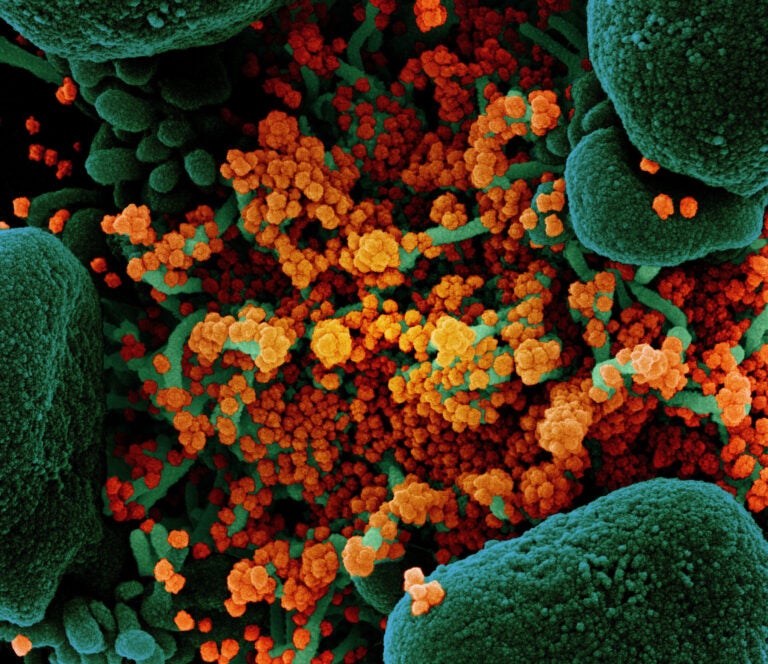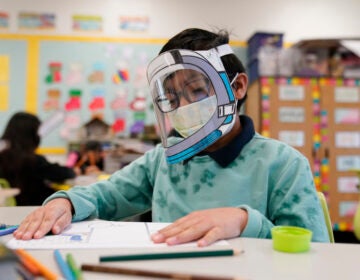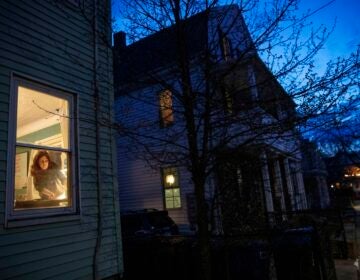Pa. coronavirus recovery: Tracing and testing delays in Philadelphia
Of the positive cases interviewed by contact-tracers, more than 40% believed they knew the person who they got the infection from, usually a household member.

A colorized scanning electron micrograph of a cell (green) heavily infected with particles (orange) from the virus that causes COVID-19, isolated from a patient sample. (NIAID)
Updated at 3:23 p.m.
–
Are you on the front lines of the coronavirus? Help us report on the pandemic.
On Thursday, the Pennsylvania Department of Health reported 122,121 coronavirus cases since the COVID-19 pandemic began, and 7,409 deaths.
Philadelphia’s Department of Public Health has reported 31,910 cases and 1,709 deaths.
Tracing and testing delays in Philadelphia
Health Commissioner Tom Farley said that one lab — Quest Diagnostics — has indicated significant delays in COVID test results, with an average turnaround time of eight days. (Quest has denied this claim in messages to WHYY, citing an average turnaround of 1-3 days.) Other labs in the city, including the city’s other primary lab, Labcorps, are reporting turnarounds of about 1-2 days. Local hospitals are also providing community testing sites throughout the city with similarly quick results.
How else to curb the spread of COVID-19? Part of Philly’s plan depends on contact tracing efforts.
The city confirmed 718 positive cases last week, 65 of which were managed by the city’s partners. For the remaining 653 infected, approximately two-thirds agreed to participate in contact tracing efforts — the remaining third either never provided their numbers (4%), refused to participate (4%), or didn’t pick up when city contact tracers called (25%).
About a third of those who participated reported that they’d had zero contact with other individuals, or couldn’t name those they’d been in contact with. Those who did remember contact with others reported about three contacts per case; 77% of those contacts, when notified, agreed to quarantine.
Could those zero-contact reports be untruthful?
“I don’t think they’re being totally truthful — I think they’re basically not cooperating,” Farley said. “People are reluctant to give us the names of folks that they’ve been around, there’s a lot of fear and mistrust out there … there’s definitely reluctance to participate … most people are willing to work with us, but there’s a sizable minority that are not.”
Still, the city plans to continue tracing as usual; “It is not working for everybody, but it is working well for a lot of people, and there’s more progress we think we’ll make with that,” Farley said Thursday. “The other benefit of the contact tracing process is it gives us more information from the cases about how they might have been exposed, which can help guide our overall response to the pandemic.”
Of the positive cases interviewed, more than 40% believed they knew the person who they got the infection from, usually a household member. 18% said they had traveled out-of-state. There was no major evidence of transmission at reopening locations like restaurants, barbershops, or hair salons. And although other cities and states have reported “super-spreader” social events, so called for their ability to infect large groups of people with COVID-19 all at once, Farley said contact tracers in Philly “have not identified any event where there’s a large number of people who have been infected.”
Philadelphia’s hired 119 contact tracers — a number significantly lower than meets the National Association of County and City Health Officials’s pandemic benchmark of 30 contact tracers per 100,000 people. But Commissioner Farley said Thursday that that benchmark was “probably more than we’ll ever be able to hire here given our funding capability.” If caseload becomes unmanageable, he said, the city might consider hiring more; currently, “we have hired a hundred or so, and we’ll see how it goes.”

Get daily updates from WHYY News!
Pa. COVID-19 task force report addresses long-held health disparities
A few months ago, Pennsylvania announced the creation of a COVID-19 Response Task Force for Health Disparity aimed at tackling health disparities among vulnerable communities, particularly Black and Latino Pennsylvanians. That task force, led by Pennsylvania Lieutenant Governor John Fetterman, released their completed report earlier this week.
The report focuses on six key issues — housing, criminal justice, food insecurity, health disparity, education and economic opportunities — each of which either directly or indirectly affects the health of Pennsylvanians.
Community feedback ranked housing as the top priority, leading Fetterman to call for the sealing of evictions for Pennsylvanians who applied for unemployment during the pandemic. The report included 56 additional policy recommendations.
WHYY is your source for fact-based, in-depth journalism and information. As a nonprofit organization, we rely on financial support from readers like you. Please give today.


![CoronavirusPandemic_1024x512[1]](https://whyy.org/wp-content/uploads/2020/03/CoronavirusPandemic_1024x5121-300x150.jpg)



